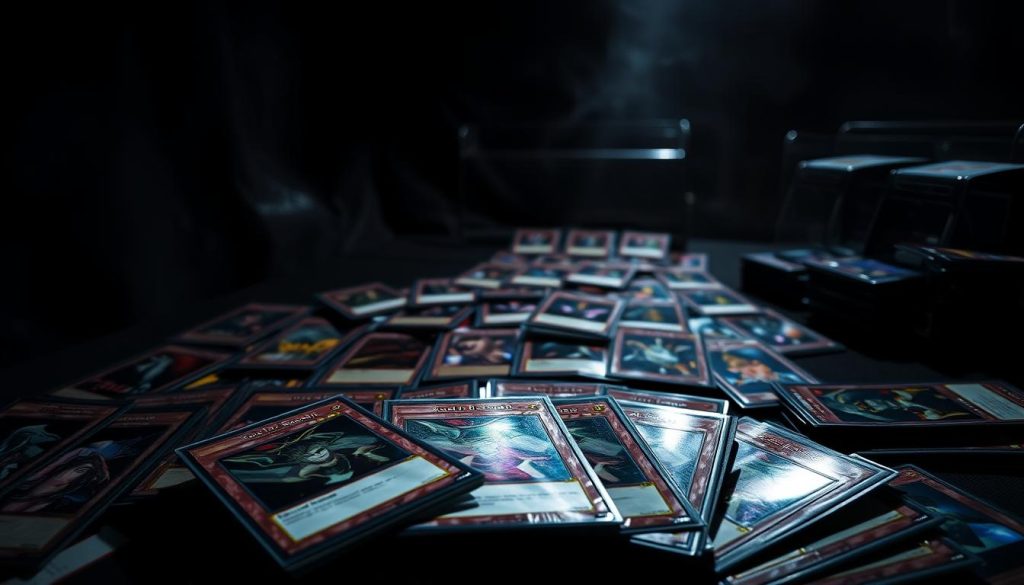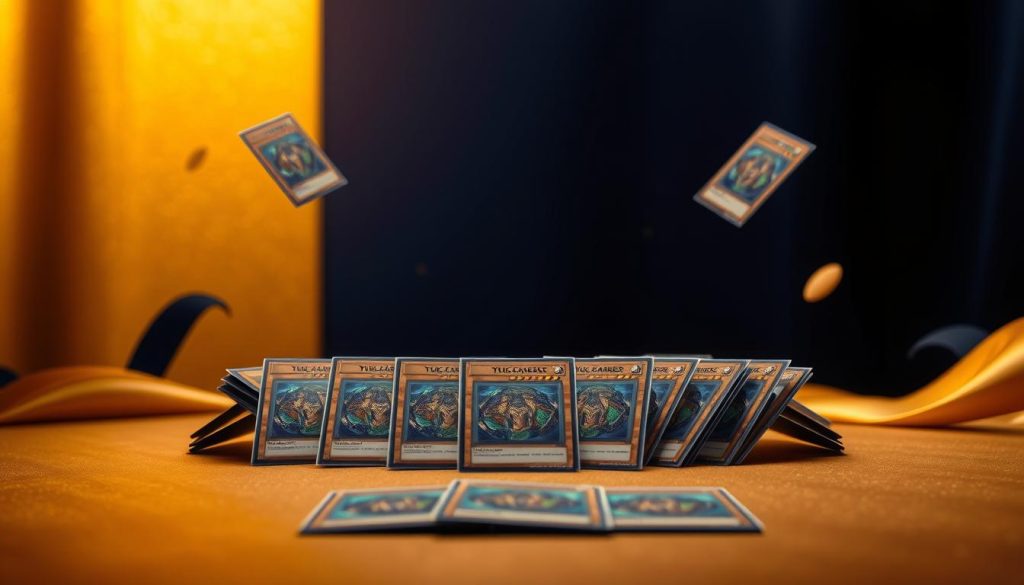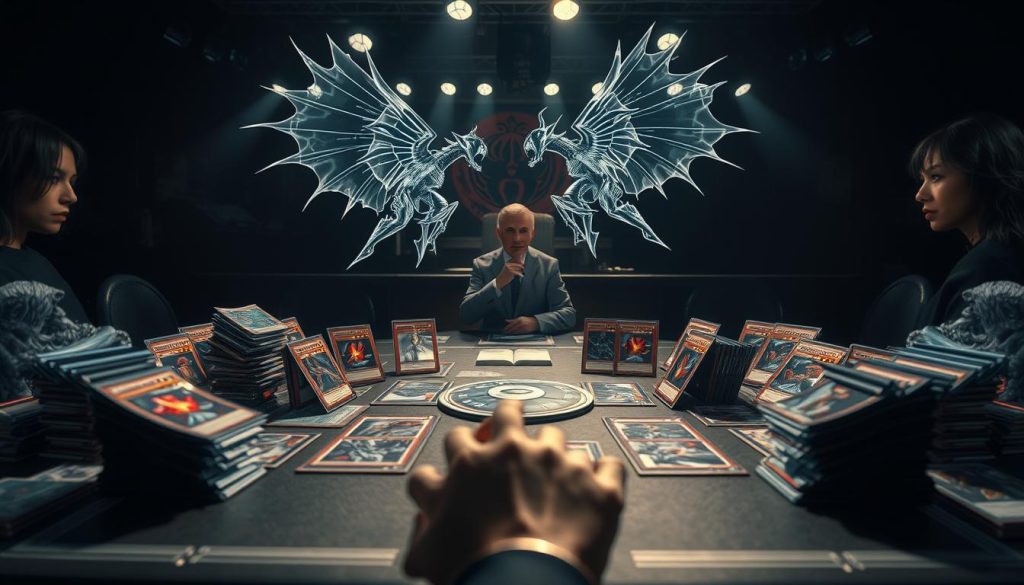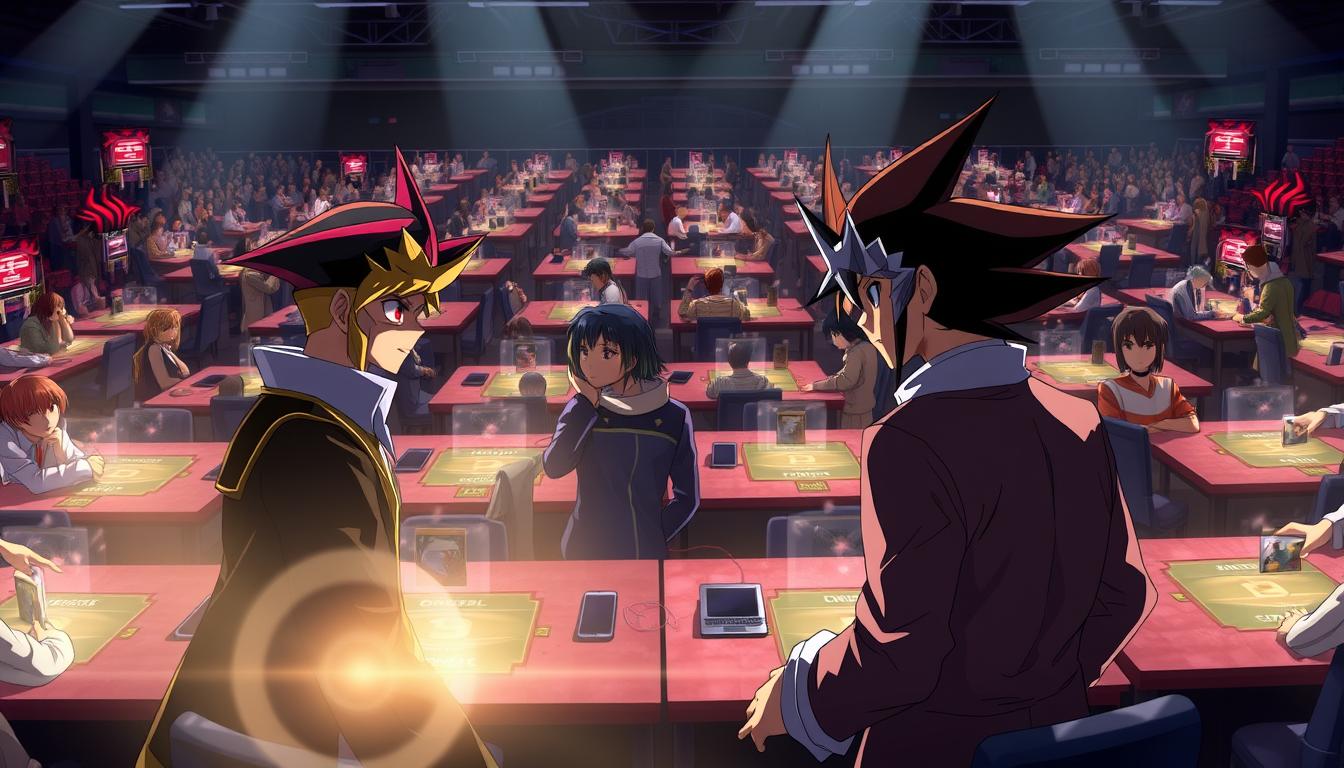Competitive Yu-Gi-Oh is more than luck. Serious players need to understand the game deeply. They must build decks well and use advanced techniques.
Looking to get better or ready for big tournaments? These tips will change how you play. They’ll help you improve your skills.
Competitive Yu-Gi-Oh needs a lot of work. Players must know the current game trends and make smart deck plans. It’s not just about having strong cards. It’s about guessing what your opponent will do and using your resources wisely.
This guide will show you how to be a pro. We’ll cover important parts of playing well. This includes how to build decks, use combos, manage resources, and get ready for tournaments.
Want to improve at Yu-Gi-Oh? Let’s explore the strategies to beat the competition. You’ll learn how to be a top duelist.
Understanding the Current Yu-Gi-Oh Meta Game
The Yu-Gi-Oh meta game is always changing. New cards and tournament results shape it. Players must keep up with top decks and strategies to win in tournaments.
To succeed in Yu-Gi-Oh, you need to know the latest strategies. It’s important to know which decks are strong and how to beat them.
Top Tier Decks in the Current Format
Several decks are leading the competitive scene right now:
- Tearlaments: A water-based strategy with incredible combo potential
- Spright: A versatile deck with strong control and combo elements
- Branded Despia: A fusion-based archetype with powerful disruption
Key Meta Game Strategies and Counters
Winning in Yu-Gi-Oh means being flexible. Key strategies include:
- Focusing on fast combo plays
- Implementing strong hand trap defense
- Building decks with multiple win conditions
Important Card Ratios and Tech Choices
Building a competitive deck is all about the right card ratios and tech choices. Players should pick utility cards that can upset their opponents or gain an edge when it matters most.
The Yu-Gi-Oh meta game favors those who can predict trends, understand deck interactions, and make smart deck-building choices. This gives them an edge in competition.
Essential Deck Building Fundamentals for Tournament Play

Building a strong Yu-Gi-Oh deck needs smart planning and knowing how to build for tournaments. Winners don’t just collect good cards. They know how to use them well.
When building a Yu-Gi-Oh deck, focus on key parts that make it strong in games. The right card ratios are key for a balanced strategy.
- Maintain a core count of 40 cards to maximize draw consistency
- Include 10-15 monster cards with complementary effects
- Balance spell and trap cards to support your primary strategy
- Select tech cards that counter popular meta game strategies
Building a deck for tournaments means thinking about how cards work together. Look at how each card can help or hurt your opponent. This helps control the game.
Pro players say to keep trying different deck versions. Try out different card numbers and tech choices. Keep improving your deck based on game results and changes.
- Analyze top-tier deck archetypes
- Understand current meta game trends
- Practice consistently with your deck
- Adapt your strategy based on tournament feedback
A winning deck is more than just strong cards. It’s how those cards work together to form a strong plan.
Mastering Chain Links and Card Timing
Yu-Gi-Oh competitive play needs a deep understanding of card timing and chain links. Players who get these can get a big edge in matches. Knowing when and how to play cards can decide who wins.
Chain links are key in Yu-Gi-Oh. They show how card effects happen in duels. Players must think about quick effects and when to play cards to get the best strategy.
Understanding Quick Effects and Priority
Quick effects let duelists act fast in different game phases. These effects can mess up opponents’ plans and open up new chances. Good players know how to use quick effects well.
- Know when to use quick effects
- Get the rules for card order
- Think about what the opponent might do
Common Timing Mistakes to Avoid
Many players have trouble with card timing in Yu-Gi-Oh. Beginners often miss important times to play cards or get chain link sequences wrong. Knowing these well can make your game much better.
- Playing effects too late
- Getting chain link order wrong
- Not seeing what the opponent might do
Advanced Chain Resolution Techniques
Skilled players use smart chain link strategies to beat opponents. They link card effects together and think about what the opponent might do. This makes the game very complex and hard for others to keep up.
Getting good at Yu-Gi-Oh chain links takes time, patience, and thinking ahead. Keep learning and playing to get better at card timing and be more competitive in tournaments.
Yugioh Card Game Tips for Resource Management

Mastering Yu-Gi-Oh resource management is key for winning in tournaments. Card advantage is the core of good gameplay. It lets players control the game’s pace and beat their opponents.
Good hand control can really boost your game. Focus on these important strategies:
- Use cards wisely to have big impact
- Find ways to interact with many cards
- Think ahead about card trades
Knowing the worth of each card in your deck is vital. Top players see card value in how they work with others, not just their strength alone.
Managing your graveyard and banished zones is smart. It’s like having extra resources. Use them to reuse powerful effects or set up combos.
- Keep track of your cards
- Plan ahead for several turns
- Use bait to trick opponents
Getting better at card advantage takes practice and smart thinking. By always checking how you use your cards, you’ll get better at competing.
Developing Effective Side Deck Strategies
Side decking is key to being a top Yu-Gi-Oh player. A good side deck can change how you do in tournaments. It gives you the flexibility to adapt during games.
Knowing how to prepare for matches is essential. Top players use side decks to beat their opponents. They focus on what their opponents are strong at and what they are weak at.
Popular Side Deck Cards and Their Applications
Choosing the right cards for your side deck is important. Experts suggest these cards for a versatile side deck:
- Artifact Scythe: Stops special summoning in critical moments
- Kaijus: Removes problematic monster threats
- Cosmic Cyclone: Handles spell and trap disruptions
- Nibiru, the Primal Being: Counters combo-heavy strategies
Match-up Specific Siding Guidelines
Every match is different, and so is your side deck strategy. It’s important to be flexible and adapt quickly.
- Analyze your deck’s vulnerabilities
- Identify opponent’s key gameplay mechanics
- Select cards that directly counter their strategy
- Practice different side deck configurations
Testing Your Side Deck Choices
Testing your side deck is vital. Try out different cards and combinations. See how well they work in simulated matches. This helps you improve your strategy.
Reading Your Opponent’s Plays and Hand Traps
Mastering the art of reading opponents is key in Yu-Gi-Oh. It’s not just about guessing. It’s about watching closely, thinking ahead, and knowing the current game trends.
When reading opponents, look for these signs:
- Card placement patterns
- Hesitation during key decision points
- Sequence of card activations
- Resource management
Yu-Gi-Oh hand traps can turn a duel around. Cards like Ash Blossom & Joyous Spring need you to guess well. Knowing your opponent’s strategy helps spot hand trap chances.
Getting better at predicting takes time. Look for small hints that show your opponent might have certain cards. These hints might be:
- Checking card counts in hand
- Pausing before making moves
- Revealing minor body language signals
- Tracking their typical deck’s common interrupt points
Top players spend a lot of time learning to read opponents and guess hand traps. By studying game trends and practicing, you can get better at Yu-Gi-Oh tournaments.
Tournament Preparation and Mental Endurance
Competitive Yu-Gi-Oh tournaments need more than just knowing cards. Winners know it’s about being ready in mind and body. It’s not just about strategy—it’s about staying sharp through long, tough games.
Physical and Mental Preparation Tips
Getting ready for a Yu-Gi-Oh tournament means taking care of yourself. Mental toughness starts with enough sleep and good food. Players should:
- Get 7-8 hours of sleep before the tournament
- Eat balanced meals with protein and complex carbohydrates
- Stay hydrated throughout the event
- Practice meditation or breathing exercises to reduce stress
Time Management During Rounds
Managing time well is key in tournament play. Players need to make quick decisions while sticking to time limits. Find a pace that lets you think without losing time.
- Practice speed-reading card effects
- Organize your play area efficiently
- Set internal time markers for each game phase
- Avoid unnecessary conversation during matches
Maintaining Focus in Long Events
Tournament days can be long, testing your mental strength. Use strategies to keep your focus sharp and avoid getting tired. Take short breaks, use quick mental resets, and stay calm no matter the outcome.
Advanced Combo Lines and Decision Trees

Mastering Yu-Gi-Oh combo lines needs deep thinking and quick decision making. Top players know advanced plays are more than just card interactions. They create detailed decision trees for different game scenarios.
Creating advanced Yu-Gi-Oh combo lines involves several key parts:
- Analyzing potential card interactions
- Understanding complex chain links
- Predicting opponent’s potential responses
- Creating flexible play sequences
Strategic decision making in Yu-Gi-Oh means players must think about many outcomes. Duelists need to quickly judge risks and rewards in each turn. This skill makes the difference between good players and champions.
Improving advanced plays includes:
- Practice multiple combo routes
- Study top-tier deck strategies
- Analyze professional tournament replays
- Test different line variations during practice matches
Successful Yu-Gi-Oh players see combo lines as flexible frameworks, not fixed scripts. Being able to change strategies during the game is key. Always learning and being flexible is essential for success.
Maximizing Practice Sessions and Testing
To get better at Yu-Gi-Oh, you need to practice a lot and smartly. Good practice methods can turn a regular player into a top competitor. It’s important to have a plan for each practice session.
There are two main ways to practice: online and in-person. Each way has its own benefits for getting better at the game.
Online Practice Strategies
- Use digital platforms like YGO Omega and Dueling Book
- Play against players of all skill levels
- Play games with people from all over the world
- Try out different decks fast
In-Person Match Analysis Techniques
- Join local tournaments
- Get feedback from experienced players right away
- Work on handling your deck better
- Make friends with other players
Looking at your matches is key to getting better. By recording your games, you can see important moments. This helps you understand your playing style and find areas to improve.
Effective Match Recording Methods
- Video record your games when you can
- Write down notes during the game
- Watch your games with trusted friends
- Make a plan to review your games
By mixing online and in-person practice with detailed match analysis, you can keep improving. This way, you can get better and move up in the rankings.
Building a Competitive Player Network
Connecting with other players in the Yu-Gi-Oh community can change your gaming experience. Networking is more than making friends—it’s a way to get better and learn from others. Local game stores, tournaments, and online sites are great places to meet players who love the game as much as you do.
Digital places like Discord servers and Reddit forums for Yu-Gi-Oh are full of chances to network. These areas let players talk about deck strategies and share news about the game. By joining in, you’ll get tips from players at all levels.
Think about joining Yu-Gi-Oh player groups in your area. Many cities have meetups where players test decks and share tips. Going to local game nights and tournaments can help you make lasting connections. These friendships can lead to learning together and even teaming up.
Your network can help you do better in tournaments. Experienced players can give advice on decks and help you find your weaknesses. Building a strong network takes time, patience, and really getting involved in the Yu-Gi-Oh community.

